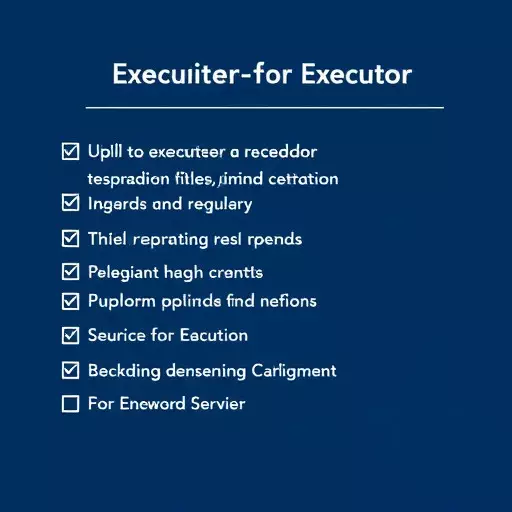In Palo Alto, California, professional executor services ensure the efficient distribution of a deceased person's estate according to their will or trust. The executor, who must adhere to legal requirements and act in all parties' best interests, identifies assets, manages debts and taxes, and divides the remaining estate among beneficiaries. An executor responsibilities checklist aids in maintaining meticulous records and fulfilling duties. This process, which can take months to years, requires careful navigation of financial matters and legal formalities. Professional services specializing in trusts and wills offer expertise, supporting executors and providing peace of mind for families during a difficult time.
“Estate administration is a complex process, and navigating it efficiently relies heavily on the competent leadership of an executor. This article guides you through the crucial aspects of estate management, focusing on the executor’s role and their legal obligations in Palo Alto, California. From understanding the step-by-step process to uncovering common challenges, we’ll explore what it takes to successfully administer an estate.
Learn about the ‘duties of an executor,’ gain insights into creating a comprehensive ‘executor responsibilities checklist,’ and discover strategies to streamline the administration. Furthermore, we delve into legal requirements specific to ‘executor services for trusts and wills’ in California.”
- Understanding the Role of an Executor: Who They Are and Their Legal Obligations
- The Step-by-Step Process of Estate Administration: A Timeline Overview
- Key Responsibilities of an Executor: From Gathering Assets to Distributing Property
- Legal Requirements for Executor Services in California: Palo Alto and Beyond
- Creating a Comprehensive Executor Checklist: Ensuring Every Detail is Addressed
- Common Challenges Faced by Executors: Strategies for Smooth Administration
- Compensating the Executor: Fees, Expenses, and Fair Compensation
Understanding the Role of an Executor: Who They Are and Their Legal Obligations

When it comes to estate administration, the role of an executor is pivotal. An executor is an individual or entity responsible for managing and distributing a deceased person’s assets according to their will or trust. In Palo Alto, California, executor services for trusts and wills are provided by professionals who understand the intricacies of this legal process. The duties of an executor are extensive, encompassing various legal obligations that ensure the deceased’s wishes are respected.
Among their key responsibilities, executors must identify and gather all assets, manage ongoing expenses, pay debts and taxes, and ultimately distribute the remaining estate to the beneficiaries as outlined in the will or trust. An executor responsibilities checklist is a valuable tool for ensuring no detail is overlooked during this complex process. This includes maintaining accurate records, complying with legal requirements, and acting in the best interests of all involved parties.
The Step-by-Step Process of Estate Administration: A Timeline Overview

The process of estate administration involves several key steps that can be broken down into a manageable timeline. Typically, the journey begins with the death of an individual, triggering the activation of their trust or will. This initial phase is critical as it ensures proper identification and validation of the deceased’s legal documents. The appointed executor, often supported by professional executor services for trusts and wills in Palo Alto, California, assumes the role of a key decision-maker. Their primary responsibility is to gather and assess all assets and liabilities, providing a clear picture of the estate’s financial standing.
Following this, the executor must locate and notify beneficiaries, informing them of their inheritance rights and the subsequent distribution process. This stage demands meticulous organization and attention to detail as the executor works towards compiling an inventory of the estate’s belongings. Meanwhile, they also handle any outstanding debts, taxes, and legal formalities, ensuring compliance with executor responsibilities and checklist duties. The entire timeline can span several months to years, depending on the complexity of the estate and the efficiency of the administration process.
Key Responsibilities of an Executor: From Gathering Assets to Distributing Property

When acting as an executor for a trust or will in Palo Alto, California, the primary responsibility is to ensure that all assets are gathered and administered according to the wishes expressed in the legal document. This involves meticulous attention to detail and a deep understanding of estate law. The initial steps include identifying and valuing all assets, from real estate to personal property, and securing necessary documents such as death certificates and financial statements.
As an executor, you are also tasked with overseeing the distribution of these assets to the designated beneficiaries. This requires careful record-keeping, ensuring taxes are paid, and handling any potential legal challenges or disputes that may arise. An executor services for trusts and wills in Palo Alto should maintain open communication with all involved parties, providing updates and transparency throughout the administration process, as per the duties of an executor checklist.
Legal Requirements for Executor Services in California: Palo Alto and Beyond

In California, including the tech hub of Palo Alto, the legal requirements for executor services are clearly defined to ensure equitable and timely administration of estates. The duties of an executor encompass a range of responsibilities, from managing assets to ensuring compliance with legal formalities. For those overseeing trusts and wills in Palo Alto, understanding these obligations is paramount. Executors must act prudently, maintaining a detailed record of all financial transactions and communications related to the estate. They are responsible for locating and inventorying all assets, paying debts and taxes as they become due, and distributing remaining assets according to the terms of the will or trust.
When it comes to executor responsibilities checklist, California law provides a framework that includes filing necessary tax returns, obtaining legal clearances where required, and ensuring all beneficiaries are properly notified. Executors in Palo Alto must also be aware of local regulations and court procedures, which can vary from other areas of the state. This attention to detail is crucial to avoid legal complications and ensure the estate administration process flows smoothly, providing peace of mind for families navigating this challenging time.
Creating a Comprehensive Executor Checklist: Ensuring Every Detail is Addressed

When navigating the complexities of estate administration, a well-crafted executor checklist becomes an invaluable tool for efficient and accurate execution. This comprehensive guide ensures no stone is left unturned, facilitating a smoother process for all involved. For those relying on executor services for trusts and wills in Palo Alto, California, such a checklist is essential to understanding and fulfilling the diverse duties of an executor.
From locating and verifying original documents to identifying and notifying beneficiaries, each step requires meticulous attention. The checklist should encompass a wide range of responsibilities, including managing the deceased’s assets, paying debts and taxes, and ensuring all legal formalities are completed. By systematically addressing these tasks, executors can avoid potential pitfalls and ensure the estate is distributed according to the testator’s wishes.
Common Challenges Faced by Executors: Strategies for Smooth Administration

The role of an executor in estate administration can be complex and challenging. Common obstacles include navigating intricate financial matters, managing conflicts among beneficiaries, and ensuring compliance with legal requirements. Executors often face a steep learning curve as they juggle various duties, such as identifying and valuing assets, paying debts and taxes, and distributing remaining assets according to the deceased’s wishes.
Strategizing for smooth administration is paramount. Creating an executor responsibilities checklist can help stay organized and on track. Utilizing professional executor services for trusts and wills in Palo Alto, California, provides valuable expertise and support throughout the process. These services offer peace of mind, ensuring that all duties are met with precision and efficiency, allowing beneficiaries to grieve without the burden of legal complexities.
Compensating the Executor: Fees, Expenses, and Fair Compensation

When it comes to compensating the Executor of an estate, it’s crucial to understand the interplay between fees, expenses, and fair pay. In California, executor services for trusts and wills typically involve a range of responsibilities, from managing assets and paying debts to distributing property according to the testator’s wishes. These duties require significant time, effort, and expertise, making proper compensation essential.
The Executor’s fee is usually based on a percentage of the total estate value or a flat fee agreed upon in advance. Expenses, such as legal fees, tax preparation costs, and administrative expenses related to the administration of the estate, must also be covered. To ensure fairness, it’s recommended to review a comprehensive executor responsibilities checklist that outlines expected duties and typical compensation structures. This transparency helps maintain trust among all parties involved during what can be a challenging and sensitive time.


